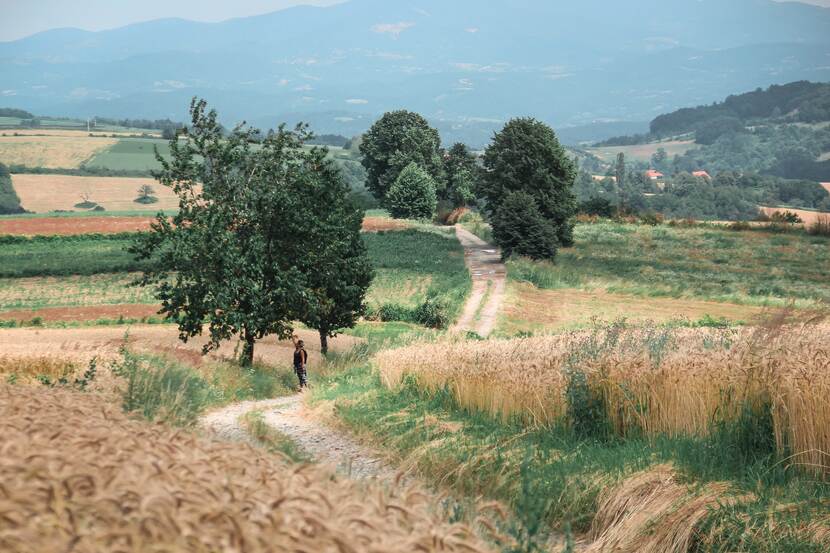Serbia: EU projects, accession updates and other news
Details on the annual report on the accession process, EU support in improving the meat market, Serbian phytosanitary visit to the Netlerlands, and the rising number of agricultural cooperatives - Our weekly briefing on agriculture, food and nature news in Serbia.

Annual report of Serbia’s EU accession achievements
Compliance with the EU’s legal standards and requirements of the accession countries is followed and reported upon on an annual basis. The European Commission (EC) published Serbia’s accession negotiation annual report in mid-October 2022. The EC almost regularly recommends the opening of negotiation chapters, i.e. negotiating clusters. However, the actual opening of clusters is decided by the Member States in Council.
The cluster on resources, agriculture and cohesion comprises policies linked to the EU structural funds and to developing capacity to assume the responsibilities of a future Member State. It also comprises some of the key policy areas crucial for ensuring sustainable food systems and helping rural communities to develop and diversify economically. The Commission has assessed that the opening benchmarks have been met for the agriculture chapter, while Serbia still has to meet all three opening benchmarks for chapter regarding food safety. Report notes limited progress achieved in some areas, e.g. submission of the IPARD III programme for 2021-2027; adoption and implementation of the law on plant protection products; classification of food establishments and establishments handling animal by-products. The full progress report for 2022 is available here.
The EU will support the improvement of the meat market in Serbia
The European Union will finance the improvement of the meat market in Serbia with €1 million through a twinning project. The goal is to support the establishment of a classification system for beef and pork carcasses in accordance with the EU's common agricultural policy.
Experts from Spain and Latvia who will cooperate with the Serbian Ministry of Agriculture will implement this project in the next 18 months. The project should establish a mandatory system of classification of beef and pork carcasses on the slaughter line and the reporting of their prices in accordance with EU regulations, as well as the application of definitions, stickers, and sales labels.
Assistant Minister of Agriculture and project leader Nenad Katanic explained that during the implementation of the project, a carcass classification system would be established in accordance with the EU common agricultural policy, by-laws would be drafted, and the national formula for classifying pig carcasses on the slaughter line would be determined. He added that the activities also refer to the training of classifiers, and the competent inspection authorities and the establishment of the systems required for the implementation of market regulation rules and measures. The representative of the EU Delegation in Serbia, Mr. Sakellaris Hourdas, mentioned the importance of trade in agricultural products, where Serbia traditionally exports more than it imports, pointing out that that is what makes the project even more important.
The number of cooperatives in Serbia increased in the last five years
A total of 2.078 cooperatives operated in Serbia in 2020, which is about 2% of the total number of legal entities. According to the Statistical Office (RZS) data, cooperatives accounted for 2% of the total number of legal entities and for 0.4% of employees in the enterprise sector with 5,378 employees. Of the total number of cooperatives, the majority is comprised of traditional agricultural cooperatives (1.293), with the largest number of employees and realized turnover. In addition to traditional agricultural cooperatives, citizens also showed interest in forming the first social, energy, labor and other specialized cooperatives. From 2016 to 2020, citizens' interest in cooperatives increased, and the number of formed cooperatives exceeded the number of closed ones by 462. The Cooperative Union of Serbia states that more than 1.100 cooperatives were formed in the period 2015 - 2022.
Serbian phytosanitary officials visited the Netherlands
A group of Serbian phytosanitary officials together with experts from National Reference Laboratory and phytosanitary departments of three national laboratories visited their counterparts in the Netherlands last week. During the three-day program the Serbian colleagues were given an overview of the Dutch potato sector.
The delegation visited seed potato producers, the National Reference Laboratory in Wageningen, the NAK lab and several potato traders, with the aim of giving a full overview of the entire supply chain and tracking and tracing of each potato consignment. Next to seed potatoes, the Serbian colleagues also visited NAKtuinbouw to hear more about virus free propagating material. Follow up activities were agreed to intensify cooperation to the benefit of trade flows.
Serbian companies at Paris food fair
Serbian companies that took part in the SIAL international food industry fair in Paris had over 1.200 meetings with potential partners, securing export deals estimated to be worth around €11 million in total. Most of their meetings at the October 15-19 fair were held with interested partners from the Western Balkan region, the EU, Turkey, Russia, Saudi Arabia, Israel, Egypt, as well as Canada and the US, says Bojana Lakovic from the Chamber of Commerce and Industry of Serbia (PKS). Supported by the PKS and the Development Agency of Serbia, 29 Serbian food companies promoted their production and export potentials at two national pavilions - one for ready-made products and another for frozen products, the PKS stated. This year's edition of the biennial trade show - the first after a four-year break due to the coronavirus pandemic - brought together over 7,200 exhibitors from 119 countries.